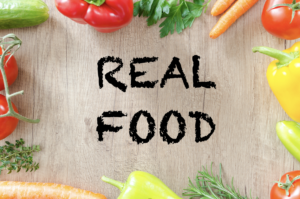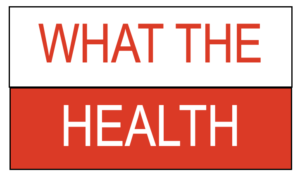 Have you seen it or heard about it?
Have you seen it or heard about it?
Both of our families were unsure what to expect, but decided to dive in and spend 90 minutes watching the documentary, “What the Health?”…despite the controversial reviews.
We had heard some of the claims from the pro-plant food film…
“Sugar doesn’t cause diabetes.”
“Eating eggs is worse than smoking a pack of cigarettes.”
Positive reviews came from our vegan friends, but we were cautious about their bias. After all, we felt it was important to consider the available facts before forming a solid opinion on the film’s claims.
We encourage you to do the same with this documentary. Be forewarned: it is one-sided so approach with caution! But it does offer some useful information that can motivate improved eating habits.
Zonya’s Family’s Summary:
 Thanks to the film being produced and narrated by a young “Gen Y” aged male, Zonya’s 17-year old son, along with his two cousins, aged 17 and 19, sat riveted for its entire duration.
Thanks to the film being produced and narrated by a young “Gen Y” aged male, Zonya’s 17-year old son, along with his two cousins, aged 17 and 19, sat riveted for its entire duration.
Zonya said, “At the conclusion of the movie, they were definitely motivated, but also frustrated and confused about what to eat.” But after a family debrief, they each walked away with:
- Desire to improve their diets by eating less meat, dairy and more vegetables (which are changes these ‘independence loving’ young men are grossly in need of).
- Open-mindedness about eating meatless meals, with the new-found knowledge they wouldn’t be protein deprived.
- Newly gained respect for people who choose to be vegans (whereas before, they had no understanding of why anyone would want to do such a thing)!
Zonya says, “I don’t know about fellow moms, but I found this to be more than worth the 90 minutes and $9.95 download price!”
Krista’s Family’s Summary:
 The Sandersons followed suit by viewing the documentary, and the reactions were similar.
The Sandersons followed suit by viewing the documentary, and the reactions were similar.
- Definitely confusion. Our 17-year old daughter said, “Now people are going to wonder “what are we supposed to eat?’!” She added, “If I eat scrambled eggs, am I going to die?”
- Our 14-year old son said he learned some interesting things, like: “I was completely surprised that Tyson Foods was supporting the American Heart Association.”
- Overall, we felt it addressed some relevant issues, including the fact that there is too much emphasis (and money) spent on treating chronic disease, and not enough on preventing it in the first place. However, blaming all chronic disease on animal foods did not seem accurate!
For better or worse, this documentary contains plenty of sensationalism. That aside, the following is our joint review.
What it gets right:
- Processed meats. An eye-opening message about our run-away love affair with processed meats and their devastating health impacts. As we all know, “processed food” is generally bad for us. But, what we don’t always think about is “processed meats” can be just as bad. See our coaching tip to help you successfully reduce your consumption of these known-to-be-harmful meats to truly “occasional.”
- Conflict of interest. A stunning exposure on how corporate sponsorship sways public health messaging (i.e., food and pharmaceutical companies provide financial support to American Cancer Society, American Heart Association, American Diabetes Association, Susan B. Komen, and others). The film compares this to the American Lung Association taking money from the tobacco industry. Posing complicated sponsorship questions to these organizations’ phone receptionists, rather than executive staff, was unfair. Still, by asking the questions, the movie host highlighted ever-so-important conflicts we all should be aware of.
- Wake up call. How our food choices affect not just us, but others: our meat-centered diet comes with a stiff price to both our health and our environment. If we buy pork from large industrial operations, we are creating demand for these products and potentially harming others. (This is just one reason why our Eat REAL America recipes put vegetables in the starring role, and keep meats and cheese to more “condiment” proportions.)
- Diet can trump genetics. Chronic disease is not inevitable. Poor food choices can contribute to chronic disease in the same way healthy food choices can prevent chronic disease.
- New appreciation. After watching “What the Health?”, you will have an appreciation for the people who choose a vegan diet. You will better understand their motivations including their desire to leave a minimal footprint on the earth.
What it gets wrong:
- “Eating an egg is the equivalent to smoking 5 cigarettes.” They referenced studies from 2010 and 2012, and if those are the only studies you read, you might believe that eggs are best avoided. But there have been many more studies conducted, and as a result, the 2015 Dietary Guidelines for Americans now state “dietary cholesterol is no longer a nutrient of concern.” It’s important to remember, eggs are a REAL food, contain beneficial nutrients and can be part of a healthy diet, especially when paired with a variety of vegetables.
- “Sugar doesn’t cause diabetes.” In their effort to demonize animal fat and protein, they reference an old study to support this misleading claim. There are mountains of research that support excess sugar consumption as an ABSOLUTE contributor to diabetes. Not to mention that sugar is hugely addictive, making it easy to overeat…and many Americans are doing just that!
- Not all animal products are created equal. They do not address the differences in the nutritional quality of meat (and the treatment of the animals) for industrial beef production vs. animals who only know life grazing on native grasses on the open prairie.
- They exclusively interview experts from the vegan “camp”. No contradictory points of view are presented. They don’t talk about the studies that show that when plant-based diets are complimented by moderate consumption of animal products, the animal products actually offer key nutrients that contribute to the prevention of chronic disease. (i.e., the Mediterranean diet, the Dash diet, Blue Zone lifestyle).
- They propose only one solution…to become 100% plant-based. Currently only 1% of the nation adheres to this diet style, and there’s a reason why: it can be very depriving and therefore difficult to maintain. In truth, the majority of the people who live the longest, are NOT 100% plant-based, but rather include some meat and dairy in moderation, while still maintaining a plant-strong, unprocessed, REAL FOOD diet!
If you are eating a vegan lifestyle, keep these things in mind:
- You must take a vitamin B12 supplement, because you cannot enough get B12 without animal foods.
- Be intentional with other important nutrients as well, like omega 3 fats (usually from fish, but are also found in chia and flax seed), calcium (usually from dairy, but can be drawn from leafy greens), pro-biotics (usually from yogurt but can be found in sauerkraut, kim chi and other raw plant foods).
- Consume beans daily in order to get the recommended protein.
So, should we point the finger solely at animal foods (like “What the Health?”) or at sugar (like “Fed Up”) or at “processed foods” (like “In Defense of Food”)? Each of these are excellent documentaries, and the fact is the vast majority of Americans currently overeat animal foods, sugar, AND processed foods. But, completely giving up animal foods or sugar is hard to do. You may realize that enjoying unprocessed meat, and minimally processed sugar, in small amounts, among recipes with vegetables as the starring role, offers the easiest, most delicious, realistic and enjoyable way of life!
The bottom line?
 Yes — watch this film! And if it convinces you to give up all animal products, just know we have LOTS of recipes to support you on that journey!
Yes — watch this film! And if it convinces you to give up all animal products, just know we have LOTS of recipes to support you on that journey!
Or, if you just want to be sure you are not overdoing animal foods by going “plant-strong,” be encouraged, that is what Eat REAL America is all about.
Only, our code word is a lot simpler…
…keep it simple and EAT REAL FOOD!


Thank you so much for weighing in on this topic! It is interesting and educational to see Krista and Zonya’s “real-life-response” to this documentary. A co-worker shared this resource with me: https://fafdl.org/blog/2017/04/24/how-to-spot-a-shockumentary-food-edition/ I especially like the Shockumentary Bingo game that this site recommends.
Thanks for sharing! Maybe we should produce a positive and inspiring documentary about how people have changed their lives once they figured out how to ignore all the noise, keep it simple and Eat REAL Food!
Excellent write up. Sadly, this documentary is more of a political hit piece (and rightly due in some cases) against normal humans…that is to say, omnivores. Sadly, it is so overtly political that they use politics to make their case: ignore information that is newer and based on larger studies and cherry-picking old studies, presented by anti-meat campaigners, to make points that, broken down from newer studies they are likely aware of, are simple lies. In fact, it’s not a documentary at all. You can watch Indiana Jones and get more truths from it. It’s really a work of fiction. Aside from that, the diet is so bizarre you have to take pills (B12) to make up for its deficiencies (probably Vit A, as well, beta carotene is a little tough on conversion to A). If eating meat is an affront to your conscience, by all means go vegan, but please don’t put your growing children on it unless you’ve educated yourself very well. It’s tough to deal with the deficiency challenges and the diet can seriously harm growing and pre-natal children: https://www.ncbi.nlm.nih.gov/pmc/articles/PMC2912628/
You mean Indiana Jones wasn’t a true story?! There is too much effort put into demonizing certain groups of foods (e.g., “don’t eat carbs” or “don’t eat meats”) and, at the same time, promoting a specific diet (in many cases where there is a personal financial interest involved). What we love about the Eat REAL America community is it is a wonderful group of people who are focused on enjoying a wide variety of REAL foods, deliciously, and letting the nutrients take care of themselves. Individuals may have reasons to avoid certain foods (e.g., gluten for those with celiac disease); however, all REAL foods provide their own unique combinations of nutrients and flavors. Thank you so much for your comment!